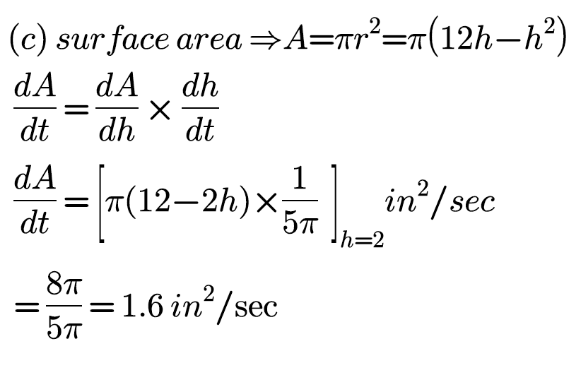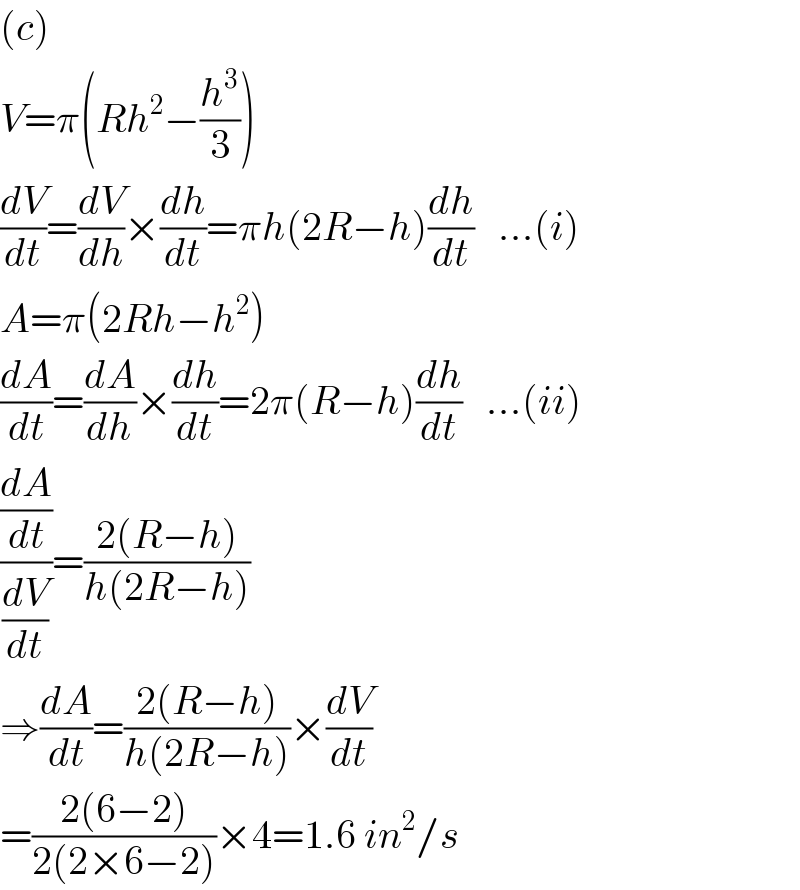Question Number 125322 by john_santu last updated on 10/Dec/20

Commented by john_santu last updated on 10/Dec/20

$${question}\:\left({c}\right) \\ $$
Commented by john_santu last updated on 10/Dec/20

Commented by john_santu last updated on 10/Dec/20

$${is}\:{it}\:{correct}\:? \\ $$
Commented by mr W last updated on 10/Dec/20

$$\left({c}\right) \\ $$$${V}=\pi\left({Rh}^{\mathrm{2}} −\frac{{h}^{\mathrm{3}} }{\mathrm{3}}\right) \\ $$$$\frac{{dV}}{{dt}}=\frac{{dV}}{{dh}}×\frac{{dh}}{{dt}}=\pi{h}\left(\mathrm{2}{R}−{h}\right)\frac{{dh}}{{dt}}\:\:\:…\left({i}\right) \\ $$$${A}=\pi\left(\mathrm{2}{Rh}−{h}^{\mathrm{2}} \right) \\ $$$$\frac{{dA}}{{dt}}=\frac{{dA}}{{dh}}×\frac{{dh}}{{dt}}=\mathrm{2}\pi\left({R}−{h}\right)\frac{{dh}}{{dt}}\:\:\:…\left({ii}\right) \\ $$$$\frac{\frac{{dA}}{{dt}}}{\frac{{dV}}{{dt}}}=\frac{\mathrm{2}\left({R}−{h}\right)}{{h}\left(\mathrm{2}{R}−{h}\right)} \\ $$$$\Rightarrow\frac{{dA}}{{dt}}=\frac{\mathrm{2}\left({R}−{h}\right)}{{h}\left(\mathrm{2}{R}−{h}\right)}×\frac{{dV}}{{dt}} \\ $$$$=\frac{\mathrm{2}\left(\mathrm{6}−\mathrm{2}\right)}{\mathrm{2}\left(\mathrm{2}×\mathrm{6}−\mathrm{2}\right)}×\mathrm{4}=\mathrm{1}.\mathrm{6}\:{in}^{\mathrm{2}} /{s} \\ $$
Commented by john_santu last updated on 10/Dec/20

$${ok}\:{correct}\:.\:{thanks} \\ $$
